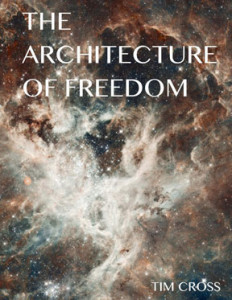Our most recent publication The Architecture of Freedom by Tim Cross has received great reader reviews–many of which are posted on Amazon.com. In addition, Kirkus Reviews just released the fabulous review printed below.
Visit the book’s website here
Buy the book at Amazon
Visit Facebook
Kirkus Review of The Architecture of Freedom 5/13/15
“An extensive, encyclopedic investigation that walks a fine line between New-Age spirituality and metaphysics.”
“Is it possible some of our central beliefs about time, space, and ourselves are wrong and our lives might change drastically for the better if we revise them? Cross investigates.
This provocative and ambitious book seeks to synthesize ideas in philosophy, spirituality, ethics, and new and old models of science to lay the groundwork for a new understanding of the place of humankind in the universe as well as the worth and purpose of human life. It’s as gargantuan a task as it sounds. The book, in keeping with this colossal goal, is sweeping in scope, moving from a discussion of recent discoveries in theoretical physics to a detailed account of how these discoveries prompt us to reconsider, and ultimately reframe, some of our most common convictions and beliefs. The project, then, is a revisionary one, encouraging readers to call into question the belief, for instance, that our view of the world is objective or exhaustive: “The reader must keep in mind that the multi-dimensional nature of the universe will always mean that it cannot be fully or accurately described using our three-dimensional concepts and language.” Cross gives intriguing descriptions of theories of the multiverse that have captured the minds of philosophers, physicists, and religious leaders for much of recent history. The goal of the project, however, is to show that understanding the connected nature of reality can help us transcend the egotistical concerns that have come to dominate our lives. In one particularly provocative chapter, the author argues that even a figure like Hitler should be understood as a necessary stage in the unfolding of a beautiful, perfect universe. In friendly, well-paced prose, the account flows and is broadly fascinating. In some cases, he puts forward claims that seem plainly at odds with common sense, and the justifications for discarding such common sense seem, at best, weakly speculative. That said, the book succeeds as an exploratory exercise in attempting to understand the practical consequences of taking up alternative stances toward the universe and our place in it.
An extensive, encyclopedic investigation that walks a fine line between New-Age spirituality and metaphysics.” – Kirkus Reviews
